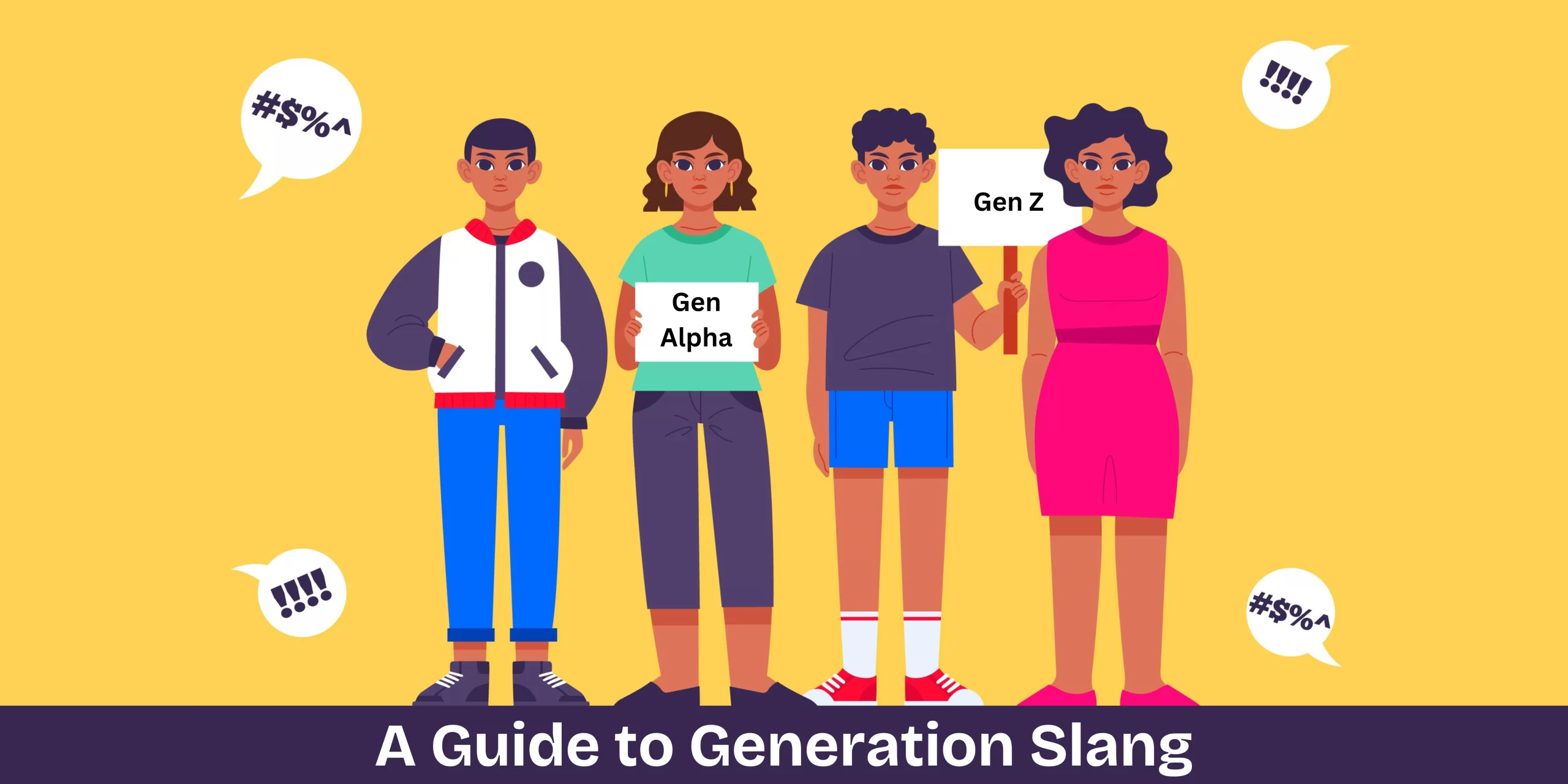Introduction: Why Slang Matters in 2025
Language evolves constantly, but the rise of Gen Z (born 1997-2012) and Gen Alpha (born 2013 onward) has made changes happen faster than ever. Thanks to social media, gaming, and meme culture, their slang spreads globally within days, often leaving older generations confused.
If you’ve ever wondered what “rizz,” “gyatt,” or “skibidi” mean, you’re not alone. Slang is more than just trendy words—it reflects the identity, humor, and values of young generations. Understanding it helps in both social and professional interactions, whether you’re a student, parent, teacher, or business professional.
Why Does Slang Keep Changing?
Slang exists for three key reasons:
- Identity & Exclusivity – Words like “gen alpha common phrases” or “gen z lingo 2024” give younger groups their own unique identity.
- Social Media & Gaming Culture – Platforms like TikTok, Instagram, and Twitter drive slang trends, making words like “flow gen z slang” popular overnight.
- Efficiency in Communication – Shortened phrases make texting and chatting faster, such as saying “bet” instead of “okay.”
💡 Fun Fact: While Millennials popularized “lit,” Gen Z and Gen Alpha introduced phrases like “it’s giving” and “thicc among us gyatt” through meme culture.
Most Popular Gen Z and Gen Alpha Slang
Here are some of the most used slang words and phrases, along with their meanings and examples:
🔥 Cool & Trendy Words
- Rizz – Short for ‘charisma,’ meaning someone is smooth or charming.
- Example: “Bro’s got mad rizz. He got her number in five minutes.”
- Gyatt – An exclamation when seeing someone attractive.
- Example: “GYATT! She looks amazing in that dress.”
- Slaps – Something that’s really good or impressive.
- Example: “This song slaps! I can’t stop listening.”
- Bussin’ – Used to describe delicious food.
- Example: “This pizza is bussin’, no cap.”
- Drip – Stylish clothing or accessories.
- Example: “That jacket? Major drip.”
- No Cap – A way to say “I’m being honest” or “for real.”
- Example: “That test was easy, no cap.”
🎭 Funny & Roasting Slang
- Mid – Something average, not impressive.
- Example: “That new superhero movie? Totally mid.”
- L – Short for “loss,” used to tease someone.
- Example: “You dropped your drink? L.”
- Ratio – When a reply gets more likes than the original post.
- Example: “Bro, you just got ratioed.”
- Cap – Another way of saying someone is lying or exaggerating.
- Example: “You said you ran 10 miles? That’s cap.”
- Glazing – Overpraising someone excessively.
- Example: “Stop glazing him; he’s not even that good.”
🎮 Gaming & Online Culture Slang
- GG – Stands for “Good Game,” commonly used in gaming.
- Example: “GG, well played.”
- NPC – Someone who acts without originality, like a background character.
- Example: “He just repeats everything online—such an NPC.”
- OP (Overpowered) – When something is too strong or unfair in a game.
- Example: “This weapon is OP; they need to nerf it.”
- Sweat – A player who tries extremely hard to win.
- Example: “These sweats in Fortnite are crazy.”
😂 Emotional & Reaction Slang
- It’s Giving – Used to describe the vibe of something.
- Example: “That outfit? It’s giving ‘90s supermodel.”
- Bet – Means “okay” or “watch me prove you wrong.”
- Example: “You think I can’t finish this project? Bet.”
- I’m Dead / 💀 – When something is extremely funny.
- Example: “That joke had me dead 💀.”
- Touch Grass – Telling someone to go outside and stop being online too much.
- Example: “You’ve been gaming for 12 hours—touch grass.”
How Social Media Shapes Slang Trends?
Platforms like TikTok, Twitter, and YouTube introduce and popularize slang quickly. Here’s how:
- Viral Trends – Words become famous through challenges, meme videos, and influencer posts.
- Streamer & Content Creator Influence – Many phrases, like “sigma grindset” and “Ohio Gen Z slang”, started from online personalities.
- Memes & Inside Jokes – What starts as an inside joke can turn into a universal slang term.
📌 Example: The phrase “thicc among us gyatt” started as a joke in gaming culture but is now widely used.
✅ Why Understanding Slang is Important
Slang is more than just words—it represents how younger generations think, express themselves, and communicate. Whether you’re a student, parent, teacher, or business owner, knowing modern slang helps you:
- Engage with younger audiences more effectively.
- Stay relevant in conversations, both online and offline.
- Avoid misunderstandings when slang is used in academic or professional settings.
💡 Need help writing an essay that sounds natural? Visit Quick Edu Help for essay writing services, coursework help, and tutoring.
Slang Across Generations: A Comparative Breakdown
Each generation develops its own slang to create identity and social connection. While Gen Alpha and Gen Z slang dominate today, Millennials, Gen X, and Baby Boomers also had their unique phrases.
Below is a comparison of how different generations expressed similar concepts:
| Concept | Baby Boomers (1946-1964) | Gen X (1965-1980) | Millennials (1981-1996) | Gen Z (1997-2012) | Gen Alpha (2013+) |
| Cool | Groovy | Rad | Lit | Fire | Slaps |
| Fun | Far out | Awesome | Hype | Vibing | Skibidi |
| Attractive | Foxy | Babe | Thicc | Gyatt | Rizzy |
| Failure | Drag | Bummer | Fail | L | NPC |
| Fashionable | Sharp | Hip | Drip | Drippy | Goofy |
This evolution shows how words evolve but remain rooted in youth culture and social trends.
💡 Fun Fact: While Millennials introduced “savage” as a compliment, Gen Z revived it with a slightly different meaning for someone brutally honest.
Why Slang Evolves So Quickly?
Unlike previous generations, Gen Z and Gen Alpha slang changes at an unprecedented rate. The main reason? Digital communication.
Here are the top three factors influencing rapid slang evolution:
1️⃣ Social Media’s Impact
- TikTok and Twitter trends create viral phrases almost overnight (e.g., “no cap” and “bet”).
- Gaming communities, like Fortnite, Roblox, and Minecraft, contribute heavily to slang.
- Memes are a primary driver of new phrases (“Ohio Gen Z slang” emerged this way).
2️⃣ Shorter Attention Spans
- Social media shortens how long a phrase stays relevant.
- Older slang words (even from 2 years ago) can feel outdated if not actively used.
- Example: Millennials popularized “YOLO,” but Gen Z replaced it with “FOMO” and “lowkey” before those became outdated too.
3️⃣ Globalization & Digital Influence
- Internet culture is borderless—slang now spreads worldwide within hours.
- YouTube, Twitch, and Instagram help share slang across countries.
- Example: “Skibidi” started as a Russian meme but is now global Gen Alpha slang.
📌 Key Takeaway: Slang doesn’t just reflect youth culture—it reflects how digital the world has become.
Common Misconceptions About Gen Z & Gen Alpha Slang
🚫 “Slang is bad English.”
✅ False! Slang is a natural part of language evolution. Just like “cool” and “dude” were once new, modern slang will eventually enter mainstream speech.
🚫 “Slang makes communication worse.”
✅ No! It actually makes it faster and more expressive, especially in texting and gaming. Short phrases like “L” and “ratio” say a lot in just one word.
🚫 “Older generations can’t use slang.”
✅ While Gen X and Millennials may feel awkward using Gen Z words, slang isn’t exclusive. The key is using it naturally—forcing it can feel cringeworthy.
Pro Tip: If you’re unsure about a slang term, listen to how younger people use it before trying it yourself!
Slang in Different Contexts: Where Can You Use It?
1️⃣ Everyday Conversations
Slang is most commonly used in casual settings like texting, gaming, and social media.
Example:
- Text Message: “That show was MID, ngl.”
- Gaming Chat: “GG, but that boss fight was OP.”
2️⃣ Social Media & Content Creation
TikTok trends drive new slang almost weekly. Many phrases come from memes, reaction videos, and influencer culture.
💡 Example: The phrase “vibe check” became a popular TikTok trend in 2020 and is still used today.
3️⃣ Academic & Professional Settings
⚠️ Warning: Avoid slang in formal writing or workplace emails.
🚀 However, if you work in social media, marketing, or youth-focused industries, knowing slang is actually beneficial!
Example: A brand targeting Gen Z might use phrases like “drip” or “bussin’” in ad campaigns.
📌 Need professional writing help? Get expert support from Quick Edu Help for your coursework and academic papers.
Final Thoughts: Why Understanding Slang Matters
Slang is more than just trendy words—it reflects how younger generations think, socialize, and engage with the digital world. Whether you’re a student, teacher, parent, or business owner, keeping up with slang helps you stay connected and avoid miscommunication.
Want to test your Gen Z and Gen Alpha slang knowledge? Try using the phrases in this guide and see if your friends recognize them!










